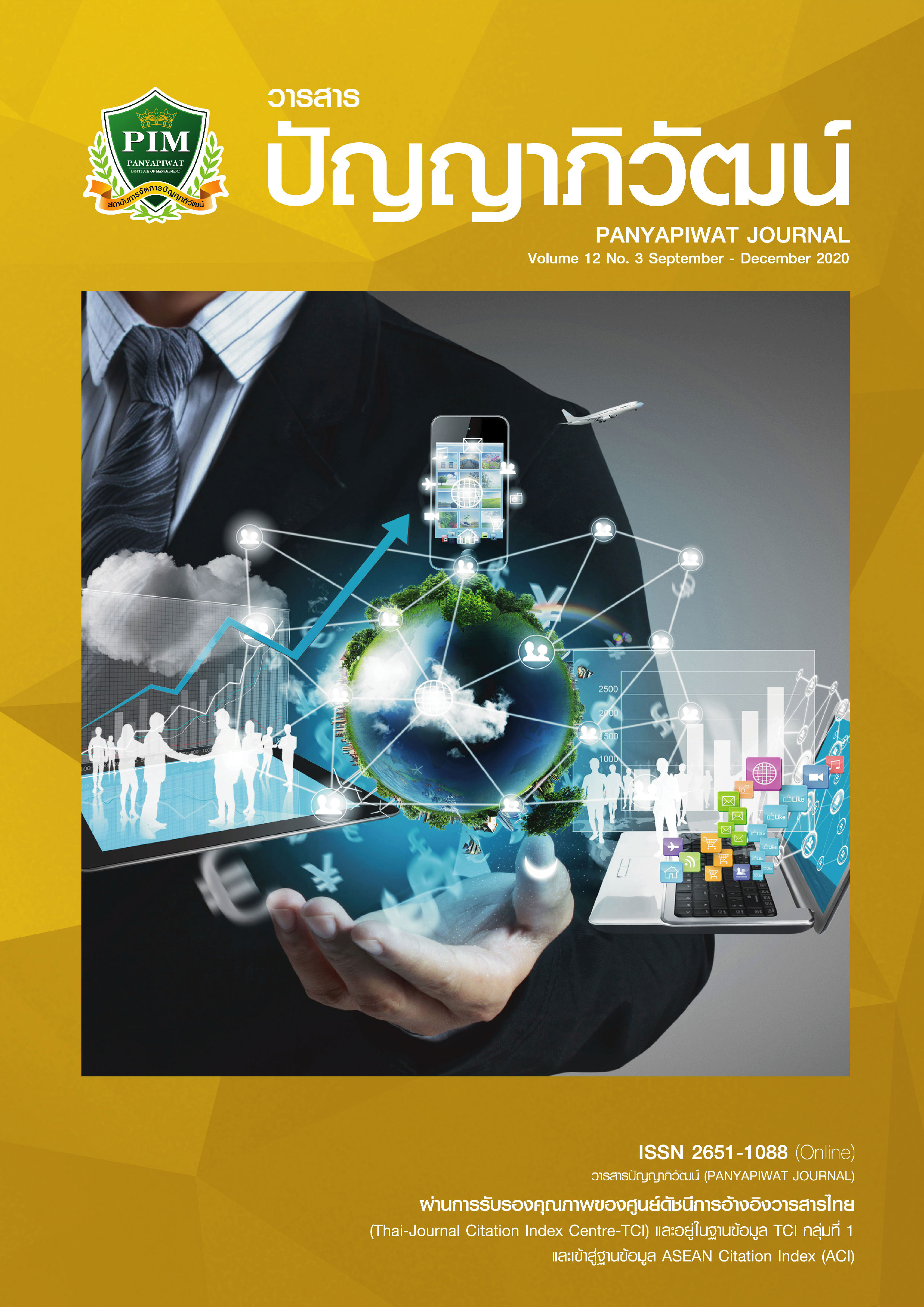การตลาดภายในองค์กรที่ส่งผลต่อการดำเนินงานด้านการเติบโตอย่างยั่งยืน ของธุรกิจสำนักงานบัญชี
Main Article Content
บทคัดย่อ
การวิจัยในครั้งนี้มีวัตถุประสงค์เพื่อศึกษาการตลาดภายในองค์กรที่ส่งผลต่อการเติบโตอย่างยั่งยืนของธุรกิจสำนักงานบัญชีในประเทศไทย ซึ่งเป็นการวิจัยเชิงปริมาณ ประชากรคือ ผู้บริหารสำนักงานบัญชี จำนวน400 ราย โดยเก็บรวบรวมข้อมูลด้วยแบบสอบถาม สถิติที่ใช้วิเคราะห์ข้อมูล ได้แก่ สถิติเชิงอนุมาน ด้วยการวิเคราะห์เส้นทาง (Path Analysis) โดยการใช้โปรแกรม AMOS ผลการวิจัยพบว่า การตลาดภายใน มี 3 ปัจจัย ได้แก่ ด้านการจูงใจพนักงาน (IMM) มีอิทธิพลต่อการเติบโตที่ยั่งยืน (SG) ด้านการมุ่งเน้นลูกค้า (IMS) มีอิทธิพลต่อการเติบโตที่ยั่งยืน (SG) และด้านการปฏิบัติงานและการฝึกกลยุทธ์ (IME) มีอิทธิพลต่อการเติบโตที่ยั่งยืน (SG) อย่างมีนัยสำคัญทางสถิติ โดยตัวแปรด้านการจูงใจพนักงานมีค่าสัมประสิทธิ์ถดถอยเท่ากับ 0.34 ค่า CR เท่ากับ 5.898 ด้านการมุ่งเน้นลูกค้ามีค่าสัมประสิทธิ์ถดถอยเท่ากับ 0.20 ค่า CR เท่ากับ 3.420 ด้านการปฏิบัติงาน การฝึก กลยุทธ์ระดับหน้าที่ไปปฏิบัติมีค่าสัมประสิทธิ์ถดถอยเท่ากับ 0.10 ค่า CR เท่ากับ 1.893
Article Details
“ข้าพเจ้าและผู้เขียนร่วม (ถ้ามี) ขอรับรองว่า บทความที่เสนอมานี้ยังไม่เคยได้รับการตีพิมพ์และไม่ได้อยู่ระหว่างกระบวนการพิจารณาลงตีพิมพ์ในวารสารหรือแหล่งเผยแพร่อื่นใด ข้าพเจ้าและผู้เขียนร่วมยอมรับหลักเกณฑ์การพิจารณาต้นฉบับ ทั้งยินยอมให้กองบรรณาธิการมีสิทธิ์พิจารณาและตรวจแก้ต้นฉบับได้ตามที่เห็นสมควร พร้อมนี้ขอมอบลิขสิทธิ์บทความที่ได้รับการตีพิมพ์ให้แก่สถาบันการจัดการปัญญาภิวัฒน์หากมีการฟ้องร้องเรื่องการละเมิดลิขสิทธิ์เกี่ยวกับภาพ กราฟ ข้อความส่วนใดส่วนหนึ่งและ/หรือข้อคิดเห็นที่ปรากฏในบทความข้าพเจ้าและผู้เขียนร่วมยินยอมรับผิดชอบแต่เพียงฝ่ายเดียว”
เอกสารอ้างอิง
Ahmed, P. K. & Rafiq, M. (2002). Internal marketing: Tools and concepts for customer-focused management. Oxford, UK: Butterworth Heinemann.
Akroush, M. N. & Al-Mohammad, S. M. (2010). The effect of marketing knowledge management on organizational performance. International Journal of Emerging Markets, 5(1), 38-77.
Anosike, C. (2014). Sustainability Efforts of One Oil Company in Niger Delta of Nigeria. Doctoral dissertation of Business Administration (D.B.A.), Walden University, USA.
Awwad, M. & Agti, D. (2011). The impact of internal marketing on commercial banks’ market orientation. International Journal of Bank Marketing, 29(2), 308-332.
Berry, L. (1981). The employee as customer. Journal of Retail Banking Services (JRBS), 3(1), 8-25.
Campo, S., Díaz, A. M. & Yagüe, M. J. (2014). Hotel innovation and performance in times of crisis. International Journal of Contemporary Hospitality Management, 26(8), 1292-1311.
Carroll, P., Johansen, M. & Mouritsen, J. (2011). Multiple integrated performance management systems. Singapore Management Review, 24(3), 21-33.
Davis, P. S., Babakus, E., Englis, P. D. & Pett, T. (2010). The Influence of CEO Gender on Market Orientation and Performance in Service Small and Medium Sized Service Businesses. Journal of Small Business Management, 48(4), 475-496.
Department of Business Development Ministry of Commerce. (2017). Registered estimates registration of Legal entity. Retrieved March 13, 2018, from http://www.dbd.go.th [in Thai]
Federation of Accounting Professions Under The Royal Patronage of His Majesty The King. (2018). News of the Federation of Accounting Professions. Retrieved March 13, 2018, http://www.fap.or.th [in Thai]
Fu, Y. K. (2013). The influence of internal marketing by airlines on customer-oriented behavior: a test of the mediating effect of emotional labor. Journal of Air Transport Management (JATM), 1, 51-52.
Jaakkola, M., Moller, K., Parvinen, P., Evanschitzky, H. & Muhlbacher, H. (2010). Strategic marketing and business performance: A study in three European “engineering countries”. Industrial Marketing Management, 39(8), November, 1300-1310.
Javad, K. P., Masood, K. & Ezat A. K. (2017). Linking internal marketing orientation to balanced scorecard outcomes in small businesses: the case of travel agencies. International Journal of Culture,Tourism and Hospitality Research, 11(3), 297-308.
Joung, H. W., Goh, B. K., Huffman, L., Yuan, J. J. & Surles, J. (2015). Investigating relationships between internal marketing practices and employee organisational commitment in the foodservice industry. International Journal of Contemporary Hospitality Management, 27(7), 1618-1640.
Jungsun, K., Hak, J. S. & Choong-Ki, L. (2016). Effects of corporate social responsibility and internal market- ing on organizational commitment and turnover intentions. International Journal of Hospitality Management, 55, 25-32.
Kanyurhi, B. E. & Akonkwa, D. B. M. (2016). Internal marketing, employee job satisfaction, and perceived organizational performance in microfinance institutions. International Journal of Bank Marketing, 34(5), 773-796.
Kaplan, R. & Norton, D. (1992). The balanced scorecard–measures that drive performance. Harvard Business Review, January-February, 71-79.
Kotler, P & Keller, K. L. (2016). Marketing management (15th ed.). UpperSaddle River, N.J.: Pearson/Prentice Hall.
Krokaew, Y. & Ussahawanitchakit, P. (2015). New Product Development Creativity and Marketing Sustainability: Evidence from Instant and Convenience Foods in Thailand. The Business and Management Review, 7(1), 242-255.
Office of the National Economic and Social Development Board (NESDB). (2018). Economic developmentplan and the national society 2017-2021. Retrieved March 13, 2018, from http://www.nesdb.go.th [in Thai]
Panigyrakis, G. G. & Theodoridis, P. K. (2009). Internal marketing impact on business performance in a retail context. International Journal of Retail & Distribution Management, 37(7), 600-628.
Ramadhan, H. (2015). Retention challenges of human resources for health: what are the alternatives incentives for retention of skilled health workers in Uganda health sector? Medical Practice and Reviews, 6(2), 16-23.
Ramos, T. B. & Caeiro, S. (2010). Meta-performance evaluation of sustainability indicators. Ecological Indicators, 10(2), 157-166.
Salehzadeh, R., Khazaei Pool, J., Kia Lashaki, J., Dolati, H. & Balouei Jamkhaneh, H. (2015). Studying the effect of spiritual leadership on organisational performance: an empirical study in hotel industry. International Journal of Culture, Tourism and Hospitality Research, 9(3), 346-359.
Sanchez-Hernandez, M. I. & Miranda, F. J. (2011). Linking internal market orientation and new service performance. European Journal of Innovation Management, 14(2), 207-226.
Sarker, M. A. R. & Ashrafi, D. M. (2018). The relationship between internal marketing and employee job satisfaction: A study from retail shops in Bangladesh. Journal of Business and Retail Management Research (JBRMR), 12(3), 149-159
Silva, E. S. (2011). Gestão Financeira-Análise de Fluxos Financeiros (Financial Management-Financial Flow Analysis). Porto, Portugal: Vida Económica.
Sivakua, W. & Faculty. (2008). Basic Accounting 1. Bangkok: Chulalongkorn University. [in Thai]
Stanley, S. (2012). The Evolution of Sustainability: A Public Relations and Business Argument. Master’s Thesis, Faculty of The USC Graduate School, University of Southern California, USA.
Vanichbancha, K. (2009). Statistics for research. Bangkok: Pimluck. [in Thai]
Yazici, S. (2010). Towards corporate sustainability: the link between business ethics, corporate governance and social responsibility. Istanbul Üniversitesi Siyasal Bilgiler Fakültesi Dergisi, 43, 1-17.
Zolfaghari, L. (2015). The impact of dynamic capabilities on sustainability performance in the biotechnology industry. Doctoral dissertation of Alliant School of Management, Alliant International University, USA.


